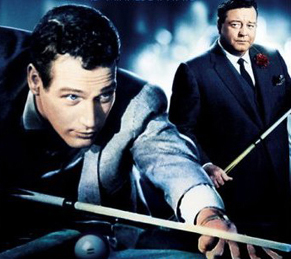 The first time America really saw Paul Newman was in “The Hustler.†The only hit he’d starred in before that was “Cat on a Hot Tin Roof,†where he played a Tennessee Williams hero who fights addiction and sexual tension, but his performance in “The Hustler†was different: He molded the character, Fast Eddie Felson, as a package for his own charm and skill, which became a jumping point that opened the door to his immortality. It was, you might say, the definitive Paul Newman role.
The first time America really saw Paul Newman was in “The Hustler.†The only hit he’d starred in before that was “Cat on a Hot Tin Roof,†where he played a Tennessee Williams hero who fights addiction and sexual tension, but his performance in “The Hustler†was different: He molded the character, Fast Eddie Felson, as a package for his own charm and skill, which became a jumping point that opened the door to his immortality. It was, you might say, the definitive Paul Newman role.
Newman didn’t just grow into the role, though – he grew into the world Eddie lived in. Everything in it seems basic and obvious, but it’s full of dubious people whose intentions are rooted in desperation and greed. He meets most of them at a local pool hall, where the rules are usually ignored – the primary act of playing for money sidesteps the “NO GAMBLING ALLOWED†sign up on the cashier’s cage. Although this world seems ideal for Eddie, he’s inevitably seduced by its darkness, and by the time he gets more than he bargained for, he’ll risk everything to escape from it.
The hardest challenge for Eddie might be to take control of his pride, which gets him into lots of trouble. He makes a bet with a famous professional named Minnesota Fats (Jackie Gleason), whose legacy includes a 15-year-old winning streak. Eddie plans to win $10,000, but it’s a lot more complicated than that. Even after winning the money, the game continues for hours. When he’s advised to quit while he’s ahead, Eddie protests: “The pool game is not over until Minnesota Fats says it’s over.â€
A great deal of Eddie’s personality depends on impulse and obscurity, and when he meets a girl who sits by herself at a bus station reading a book, he gets the feeling that she’s just as internal as he is. Her name is Sarah (Piper Laurie) and she loves to drink, but there’s more here than meets the eye: When Eddie develops a relationship with her, he discovers that Sarah’s loneliness is rooted in her fear of heartbreak. Her desperation is human and urgent, and when Eddie’s satanic business partner (George C. Scott) organizes a match in Louisville, he has no choice but to bring her along for his descent into the world of greed.
Events like these work better in black and white – color photography might’ve flattered these characters instead of suspecting them. Everybody here lives in the shadows of cynicism and secrets, to the extent that the cleverest have learned how to exploit the desires and fears of others.
The wonderful thing about Eddie, though, is the way he stands out as the exception. He counts on his dancing blue eyes and sincere grin to rail against darkness, and no one could’ve played him better than Newman. He got to play Eddie again in “The Color of Moneyâ€: Shooting in color this time might’ve been appropriate, because by the end of “The Hustler,†Eddie had emerged from the shadows. So had Newman.

This movie is a classic, and I also liked the color of money!!!